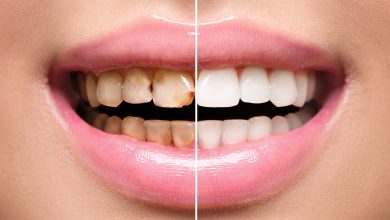What are Dental Veneers Made Of?
Dental veneers are made of either porcelain or composite resin, thin shells that are custom-made to fit over the front surface of teeth. They are a popular cosmetic dental treatment to improve the appearance of teeth by addressing various aesthetic concerns such as discoloration, chipping, or misalignment.
Veneers made from porcelain are highly durable and resistant to stains, providing a natural-looking result. Composite resin veneers are less expensive and can be directly applied in one visit. The choice of material will depend on factors such as the patient’s preference, budget, and the recommendation of the dentist.
Dental veneers are an effective solution for achieving a beautiful and confident smile.

Credit: wmsmile.com
Different Materials Used For Dental Veneers
Dental veneers are a popular choice for enhancing the appearance of your smile. They are thin custom-made shells that are bonded to the front surface of your teeth to give them a natural, attractive look. Veneers can be made from different materials, including porcelain and composite resin.
Porcelain veneers are the most common type of veneers used in cosmetic dentistry. They are constructed from a durable, stain-resistant material that closely resembles natural teeth. Porcelain veneers can provide a long-lasting solution for issues such as discoloration, chipped or cracked teeth, and gaps between teeth.
Composite resin veneers, on the other hand, are made from a tooth-colored filling material that is applied directly to the teeth. This type of veneer is more affordable and can be completed in a single visit to the dentist. Composite resin veneers are often used to improve the appearance of teeth that are slightly misaligned or have minor chips or gaps.
Pros And Cons Of Porcelain Veneers
htmlDental veneers are a popular cosmetic dentistry solution for enhancing the appearance of teeth. Porcelain veneers are one type of dental veneer that offer many advantages. Their natural appearance is one of the main reasons why they are highly sought after. Porcelain closely resembles the color and translucency of natural teeth, creating a seamless blend and a beautiful smile.
Another benefit of porcelain veneers is that they are stain-resistant. Unlike natural teeth, which may become discolored over time due to consumption of certain foods and drinks, porcelain veneers maintain their white and bright appearance.
Porcelain veneers are also durable and long-lasting when properly cared for. With regular dental visits and proper oral hygiene, they can last for many years, making them a worthwhile investment in your smile.
It’s important to note that getting porcelain veneers typically requires multiple dental visits. The process involves consultation, preparation of the teeth, and the placement of the veneers. However, the final result is worth the time and effort.
Pros And Cons Of Composite Resin Veneers
Composite resin veneers are a more affordable option compared to porcelain veneers. They offer a cost-effective solution for those seeking to enhance their smile without breaking the bank. Another advantage is that composite resin veneers require less removal of natural tooth enamel, making them a more conservative option. However, it is important to note that these veneers are more prone to staining, especially when exposed to foods and beverages with strong pigments like coffee or red wine. Staining can be minimized with regular oral hygiene practices and avoiding excessive consumption of staining agents. Additionally, composite resin veneers are not as durable as porcelain veneers and may not withstand heavy biting forces or grinding habits. Therefore, proper care and maintenance should be taken to ensure the longevity of these veneers.
Factors To Consider When Choosing Veneer Materials
Dental veneers are thin, custom-made shells that are placed on the front surface of the teeth to enhance their appearance. When choosing veneer materials, there are several factors to consider:
| Factors to Consider | |
|---|---|
| Budget | Different veneer materials have varying costs. Porcelain veneers tend to be more expensive compared to composite resin veneers. |
| Desired aesthetic outcome | Porcelain veneers are known for their natural and translucent appearance, closely resembling natural teeth. Composite resin veneers offer more versatility in color matching. |
| Oral health condition | Porcelain veneers are generally more suitable for individuals with healthy teeth and gums, while composite resin veneers can be applied to teeth with minor damage or decay. |
| Long-term maintenance | Porcelain veneers are highly resistant to stains and can last for many years with proper care. However, they may require eventual replacement. Composite resin veneers are prone to staining and may require more frequent maintenance. |
Considering these factors can help you make an informed decision when selecting the appropriate veneer material for your needs.
How Are Dental Veneers Customized?
How are Dental Veneers Customized?
Dental veneers are customized to provide the perfect fit and natural look for each patient. This process involves several steps: dental impressions and measurements, shade selection, and trial placement and adjustments.
During the initial stage, dental impressions and measurements are taken to create a mold of the patient’s teeth. This ensures that the veneers will be made to the exact specifications of the individual’s mouth.
Next, shade selection plays a crucial role in achieving a seamless blend with the natural teeth. Dentists work closely with patients to determine the most suitable shade that matches the patient’s natural teeth or desired look.
Finally, trial placement and adjustments are conducted to ensure that the veneers fit properly and comfortably. This step allows both the patient and the dentist to evaluate the appearance and functionality of the veneers before they are permanently affixed.
Through the meticulous customization process of dental impressions, shade selection, and trial placement, dental veneers can enhance smiles and provide long-lasting results.
The Dental Veneer Placement Process
htmlDental veneers are thin, custom-made shells that are designed to cover the front surface of the teeth, improving their appearance. The placement process typically involves the following steps:
Tooth Preparation:
Prior to placing the veneers, a small amount of tooth enamel may be removed. This ensures a proper fit and allows for the veneers to be securely bonded to the teeth.
Temporary Veneers:
While the permanent veneers are being created in a dental laboratory, temporary veneers may be placed on the teeth for protection and aesthetics. These temporary veneers are usually made from acrylic or composite resin.
Bonding The Veneers:
Once the permanent veneers are ready, they are bonded to the teeth using a dental adhesive. The adhesive is applied to the veneers, and then they are carefully positioned on the teeth. Finally, a special light is used to harden the adhesive, ensuring a strong and durable bond.
| Advantages of Dental Veneers |
|---|
| – Natural appearance |
| – Stain resistance |
| – Can correct various dental flaws |
| – Minimal tooth preparation |
| – Long-lasting results |
Summary:
Dental veneers are an effective cosmetic dentistry solution that can enhance the appearance of teeth. The placement process involves tooth preparation, temporary veneers, and bonding of the veneers using dental adhesive. Dental veneers offer a natural-looking, stain-resistant solution to various dental flaws, and they can provide long-lasting results.
Aftercare Tips For Dental Veneers
Dental veneers are thin, custom-made shells that are bonded to the front surface of teeth to improve their appearance. They are typically made of either porcelain or composite resin materials.
After getting dental veneers, it is important to follow proper aftercare tips to ensure their longevity. Maintaining a regular oral hygiene routine is crucial in keeping veneers in good condition. This includes brushing twice a day with a soft toothbrush and non-abrasive toothpaste, as well as flossing daily.
Avoiding excessive force or pressure on veneers is essential to prevent damage. This means avoiding habits like biting into hard foods or using the teeth as tools to open packages. It is also advisable to wear a mouthguard during sports or activities that involve contact.
Regular dental check-ups should be a part of your oral care routine, even with veneers. These check-ups allow your dentist to monitor the condition of your veneers and address any concerns before they escalate into larger issues. Professional cleanings can also help maintain the appearance of the veneers.
Frequently Asked Questions On What Are Dental Veneers Made Of?
What Happens To Teeth Under Veneers?
Veneers are thin coverings placed on teeth. Underneath, the teeth remain intact. The process involves removing a small amount of enamel to fit the veneers.
How Long Do Dental Veneers Last?
Dental veneers typically last for around 10-15 years with proper care and maintenance.
Can You Eat With Veneers?
Yes, you can eat with veneers. However, it’s important to be cautious with hard or sticky foods to avoid damaging them. Regular oral hygiene is also key to maintain the lifespan of your veneers.
Are Veneers Strong As Real Teeth?
Yes, veneers are a strong alternative to natural teeth. They are made from durable materials and can withstand normal biting and chewing pressures. However, they may not be as strong as real teeth and can chip or crack under excessive force or bruxism.
Conclusion
Overall, now you have a clearer understanding of what dental veneers are made of. Whether you opt for porcelain or composite resin veneers, these custom-made shells offer a natural-looking and durable solution to various dental imperfections. By consulting with your dentist, you can decide which material is best suited for you and achieve the beautiful smile you’ve always desired.
Don’t hesitate to schedule an appointment to explore this transformative dental treatment. Your dream smile awaits!





